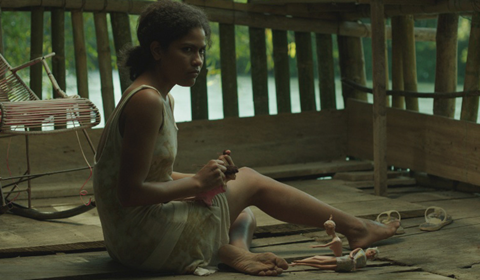Dir. Felipe Guerrero. Colombia/Argentina/Netherlands/Germany/Greece. 2016. 107mins.

The setting for Felipe Guerrero’s debut feature is the lush forest interior of Columbia. At first glance, it is a verdant paradise. But armed paramilitaries roam the jungles and a messy, unfocused war rages. This is a world in which the poor are casually victimised and poor women fare the worst of all. It is perhaps for this reason that Guerrero has almost entirely stripped out the dialogue from this study of three separate women who flee from the war-torn rural areas to the relative safety of Bogota. Symbolically, and literally, the women have been denied a voice.
It’s a demanding watch, but it is not unrewarding
The film, which was developed with support from the Hubert Bals Fund, is deliberately slow in its approach. And as such, it represents a marketing challenge theatrically. However there is likely to be more interest on the festival circuit, particularly since the Oscar nomination for Ciro Guerra’s Embrace Of The Serpent has drawn attention to Columbia’s filmmaking output.
The title translates as ‘dark beast’, a potent metaphorical image which evokes the danger which stalks the central characters and the fear that eats at them from inside. Without dialogue, and the exposition and illumination which it could bring to the political backdrop, the film relies heavily on symbolism, of which the title is just the first instance.
The first character we meet is Rocio (Marleyda Soto), a woman who is torn from her village life which she returns from an errand – she carries a basket of laundry – to find her home wrecked and deserted. We are stuck by her stillness. Guerrero’s measured approach throughout allows the characters plenty of time and space to process their changing world. Sometimes it’s a little too much time and space. In a sudden rush of action, Rocio is roused from her shock, packs her meagre belongings and races into the forest in case the soldiers return.
Meanwhile La Mona (Jocelyn Meneses) plays with battered dolls while she waits for the return of her boyfriend, a brutal paramilitary who repeatedly beats her and rapes her. While he sleeps, La Mona, now miscarrying his child, summons her strength and stabs him repeatedly.
The third key character is Nelsa (Luisa Vides), a fighter who becomes disillusioned after she has to bury the bodies of slaughtered farmers. Handsome, strong and the equal of any of the male soldiers, she still finds herself required to provide sexual services to her commander. Like the other two women, Nelsa takes to the road, heading for the sanctuary of the city.
Without dialogue, we become sensitised to the sounds of the forest. Roberta Ainstein’s sound design creates an enveloping soundscape which extends beyond the frame. The constant chatter of birds competes with the crackle of distant gunfire; the sound of children swinging a rope drowns out the tinny chatter from the radio and the patter of rain on tarpaulins.
It’s a demanding watch, but it is not unrewarding. However the decision to remove all dialogue does mean that we are left with numerous questions about the political backdrop which has impelled these women to flee from everything and attempt to rebuild their lives entirely.
Production company: Mutokino, Gema Films, Viking Films Sutor Kolonko, Boo Productions
International sales: Mutokino mutokino@gmail.com
Producers: Felipe Guerrero, Gema Juarez Allen, Marleen Slot, Ingmar Trost, Vicky Miha
Screenplay: Felipe Guerrero,
Cinematography: Fernando Lockett
Editor: Eliane D. Katz
Production design:Marcela Gomez
Main cast: Marleyda Soto, Louisa Vides, Jocelyn Meneses
























